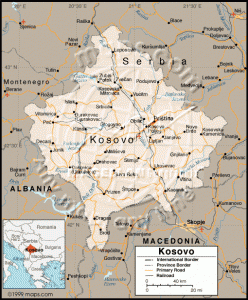
"We expect to be recognized by the first countries any minute," said Prime Minister Hashim Thaci to his cabinet. Most of the European Union's 27 member nations are expected to recognize Kosovo. The United States is prepared to recognize Kosovo as well; President George W. Bush supported their actions during his trip to Africa. In an interview broadcast live from Tanzania, Bush said, "The Kosovans are now independent. It's something I've advocated along with my government."
Meanwhile, Serbia continued to oppose Kosovo, and has now taken legal action against its leaders. Serbian lawmakers rejected the proclamation as "invalid" and "illegal". The President, Prime Minister, and Speaker of Kosovo were charged with "a serious criminal act against the constitutional order and security of Serbia", according to the Interior Ministry.
Serbia will also attempt to prevent Kosovo from gaining admission into the U.N. and other international organizations, with the help of Russia. "The so-called Kosovo state will never be a member of the United Nations," said Serbian foreign minister Vuk Jeremic. "Serbia will use all diplomatic means at its disposal to block Kosovo's recognition."
Russia, which has historically been against Kosovan independence, reiterated their opposition to the act. "Our position is that this declaration should be disregarded by the international community," said Vitaly Churkin, Russia's United Nations ambassador. Churkin said he worried for the safety of the Serb minority in Kosovo. "We'll strongly warn against any attempts at repressive measures should Serbs in Kosovo decide not to comply with this unilateral proclamation of independence," he said.
Several thousand ethnic Serbs living in Kosovo went to rallies to protest the declaration, where chants of "This is Serbia!" could be heard. Marko Jaksic, leader of the Serbian Assembly of Kosovo and Metohija, showed up at one of the rallies. "America is no longer the single world power," he said. "The Russians are coming. As long as there is Russia and Serbia, there will never be an independent Kosovo."
Protests held in the Bosnian city of Banja Luka were more violent. Dissenters held up signs reading "Kill the Albanians!", and stones and eggs were reportedly thrown at police.
The European Union has agreed to send some 2,000 police officers and civil administrators to Kosovo to stabilize the situation and help build institutions. "I think it's very important that we recognise that all of the countries of the Western Balkans are European countries and therefore it's critical that Europe shows real leadership in how it ensures that peace and stability are the order of the day," said United Kingdom foreign secretary David Miliband.
Despite the majority of European Union members that are expected to recognize Kosovo, several nations, including Spain, have already rejected their claim to independence. "The government of Spain will not recognize the unilateral act proclaimed yesterday by the assembly of Kosovo," said Spanish foreign minister Miguel Angel Moratinos. Spain thinks the declaration does not respect international law, he explained.
In China, Foreign Ministry spokesman Liu Jianchao expressed concern over Kosovo's bid for independence. "Kosovo's unilateral act can produce a series of results that will lead to seriously negative influence on peace and stability in the Balkan region," he said.
Other nations which will not recognize Kosovo include Sri Lanka, Cyprus, Greece, Slovakia, Bulgaria, Romania, Indonesia, Vietnam, and Azerbaijan.
The United Nations Security Council is scheduled to discuss the issue later today.
